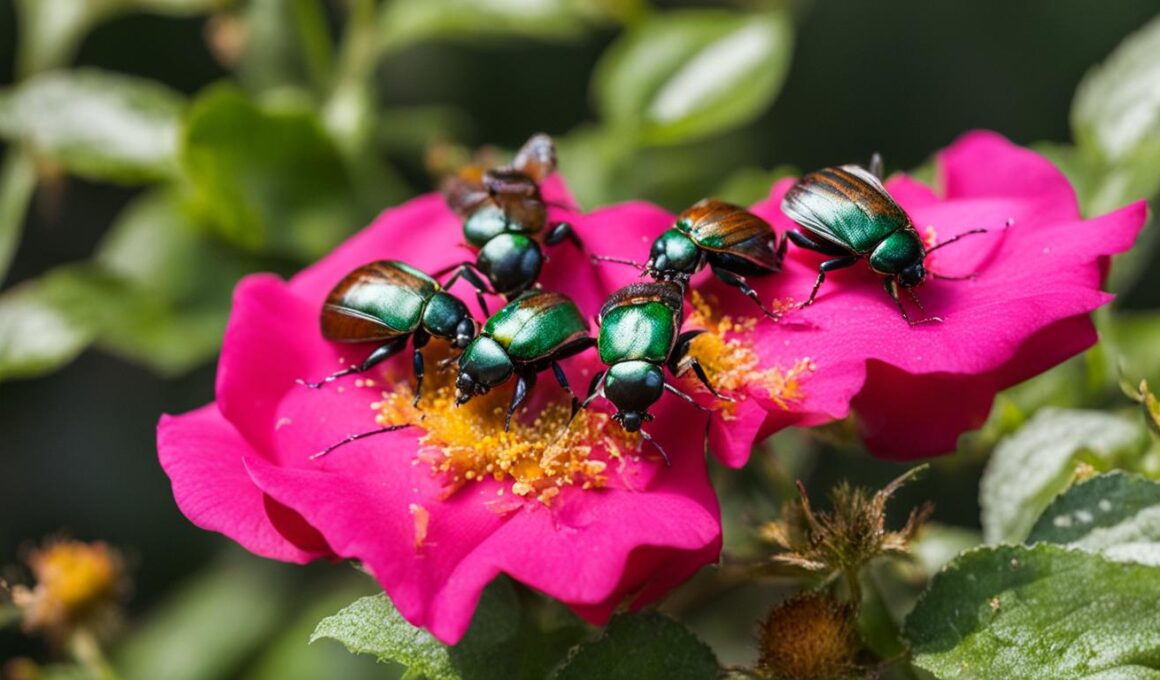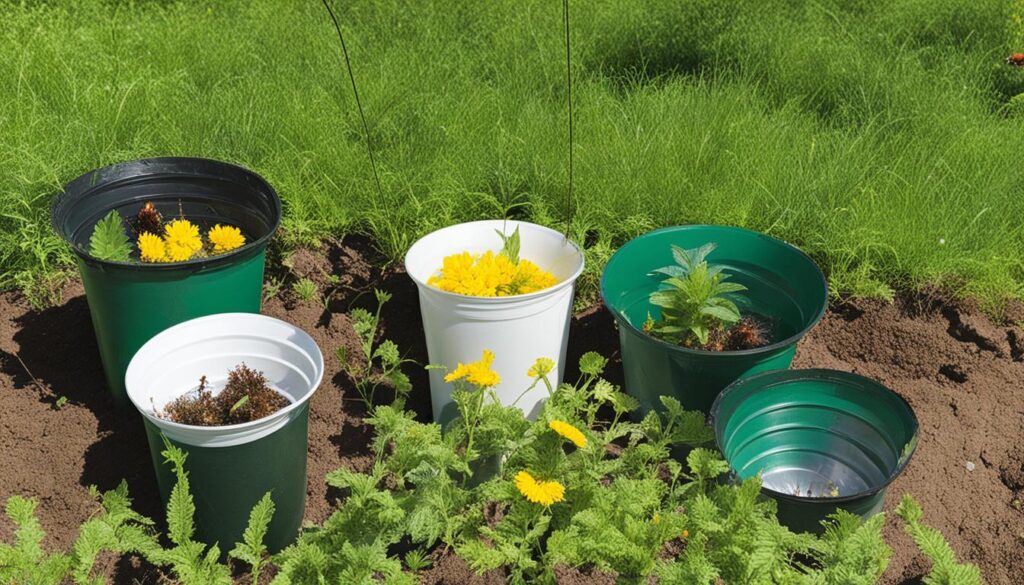If you’re dealing with Japanese beetles in your garden, you’re no stranger to the damage they can cause. These small metallic green insects with copper wings feed on over 300 different species of plants, making them a major pest for gardeners.
When it comes to controlling Japanese beetles, many organic methods can be effective. One such method is using soapy water. This simple and affordable option can help eliminate these pests without the use of harmful insecticides.
Early in the morning, when the beetles are slow and sluggish, you can gently shake them off the plants into a bucket of soapy water. The soapy water will drown the beetles. This method works because the beetle’s response to disturbance is to fall to the ground or into the bucket, rather than fly away.
In addition to soapy water, other organic control methods can help manage Japanese beetles. For example, you can cover individual plants with mesh or netting during peak beetle feeding to protect them. It’s also important to regularly check your plants and properly identify any pest issues for effective pest management.
In the following sections, we will explore other methods for controlling Japanese beetles and conclude with a summary of these organic options.
Other Methods for Controlling Japanese Beetles
If you’re looking for alternative methods to control Japanese beetles in your garden, there are several options to consider. While we have discussed the effectiveness of soapy water and insecticides in the previous section, there are a few more tactics worth exploring. Let’s take a look at some additional methods for dealing with these pesky pests.
- Beetle traps: While beetle traps may seem like a convenient solution, they should be avoided. These traps tend to attract more beetles to your garden, potentially worsening the infestation.
- Diatomaceous earth: While diatomaceous earth can be effective in controlling Japanese beetles, it’s important to exercise caution. This powdery substance can harm other beneficial creatures in your garden, such as monarch caterpillars. Use diatomaceous earth sparingly and precisely, targeting areas where Japanese beetles are most active.
- Nematodes: Some gardeners recommend the use of nematodes to combat Japanese beetles. However, this method requires specific timing and optimal soil conditions for maximum effectiveness. Nematodes are microscopic worms that can attack and kill beetle larvae in the soil.
- Companion planting: Another strategy is to consider companion planting. Certain plants, such as garlic, scallions, marigolds, and catnip, are known to repel Japanese beetles. Interplant these repellent species with your vulnerable plants to help keep the beetle numbers lower.
- Milky spore: One of the most effective long-term solutions for controlling Japanese beetles is the use of milky spore. This natural bacterium specifically targets the grub stage of the beetle’s life cycle, preventing their population from growing. It’s best applied in late summer or early fall, when the soil temperature is ideal for the bacterium to thrive. Milky spore lasts for years, providing ongoing protection for your garden.
By incorporating these methods alongside soapy water and insecticides, you can create a comprehensive pest management plan to combat Japanese beetles effectively. Remember to monitor your plants regularly and identify any issues promptly for the best results.
Conclusion
Japanese beetles are a common garden pest that can wreak havoc on your plants. However, there are effective organic methods for controlling these pests without relying on harmful chemicals.
One of the simplest and most environmentally friendly methods is using soapy water. Early in the morning, when the beetles are sluggish, you can shake them off your plants and into a bucket filled with soapy water. This will effectively eliminate the beetles without causing harm to the surrounding environment.
Insecticides are another option for pest control, but they need to be reapplied and can harm pollinators such as bees. It is crucial to apply them in the evening when bees are less active to minimize the risk.
There are also other methods available, such as beetle traps, diatomaceous earth, nematodes, companion planting, and milky spore. Milky spore is particularly effective as a long-term control method and only needs to be applied once per season. Regularly checking your plants and properly identifying issues are crucial for effective pest management.
Can Soapy Water Be Used to Repel Wasps as Well?
Yes, soapy water can be used to repel wasps. However, a more effective and natural method is to use citronella for repelling wasps. Citronella oil has been proven to deter wasps and other insects, making it a great alternative to chemical repellents.
Source Links
- https://northerngardener.org/japanese-beetle-solutions/
- https://www.cjonline.com/story/lifestyle/home-garden/2019/07/19/ariel-whitely-noll-soapy-water-will-kill-japanese-beetles/986693007/
- https://www.cjonline.com/story/lifestyle/home-garden/2021/07/02/soapy-water-organic-method-controlling-japanese-beetles/7805734002/










